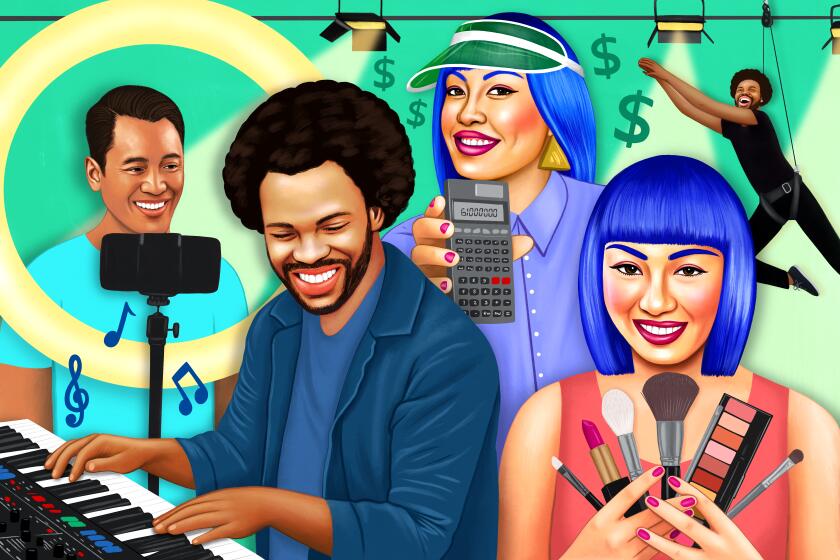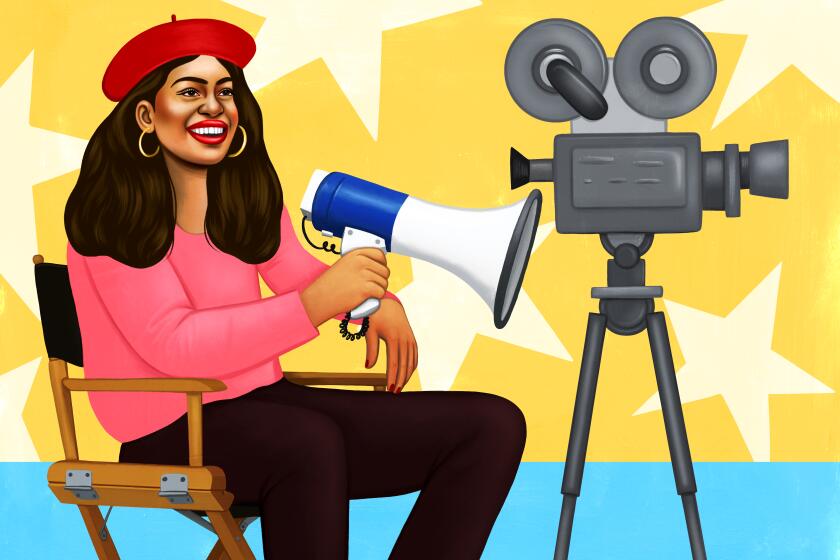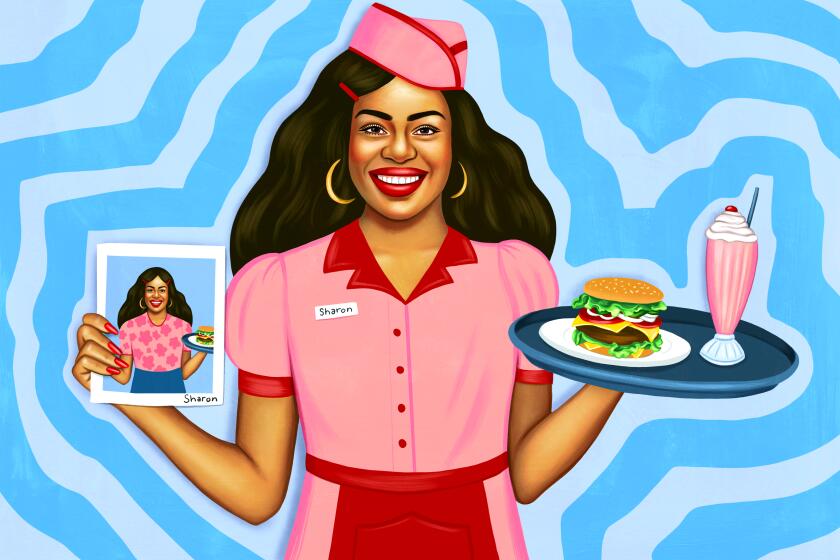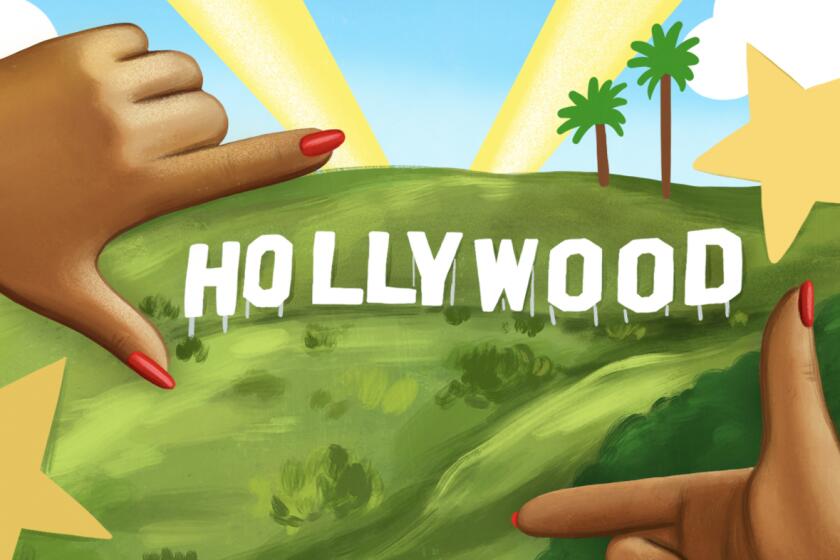Explaining Hollywood: How to get a job as a director

- Share via
Steven Spielberg once described his job this way: “I dream for a living.”
The role of a director is often the most esteemed on a production. They create the vision for a story, run the set and call “action!” for the performers. They are revered, respected and sometimes feared.
Most people are familiar with live action feature directors like Spielberg, James Cameron, Kathryn Bigelow, Spike Lee or Alejandro González Iñárritu. But there are many different kinds of directors, and the routes to become one are many and varied.
Here’s a primer on the profession and how to break into the role.
Who becomes a director?
Directors for many years have been overwhelmingly white and male. “And here are the all-male nominees,” quipped Natalie Portman during the 2018 Golden Globes.
Like other Hollywood unions, the Directors Guild of America has been striving to diversify its membership. The DGA has various steering committees that represent marginalized groups to increase their representation across the industry.
That improvement has come, but the latest survey by the DGA found that out of 2,700 episodes of TV produced in the 2020-21 season, 62% of directors were white and 62% were male.
Diversity in the feature film world is much lower than in television. In its latest survey, the DGA found that of the 651 features released in 2017, just 12% of the directors were women. Of the 145 directors of DGA features released in North America in 2017 with a minimum box office of $250,000, just 10% were directors of color.
As a director, strong skills in leadership and storytelling are essential.
“It’s huge that you understand story, that you understand how to break down a script, that you have a very strong visual sensibility,” said Regina Ainsworth, an L.A.-based short features director.
Leadership styles will vary from director to director.
“Their manners and personalities can be extraordinarily different but on some deep level, they’re imposing their vision on the world,” said Stephen Galloway, dean of Dodge College of Film and Media Arts at Chapman University.
The first step in your Hollywood career shouldn’t be paying L.A. rent. Here’s how to take your first steps toward a career in the entertainment industry, according to experts.
How do you get started?
Film school is an obvious path, connecting aspiring live-action film and TV directors to a community of filmmakers and future contacts.
Some directors also get their start at art schools.
“Many [art schools] are looking for fresh new voices and communities who want to creatively express themselves,” said Cheryl Dunye, who has directed episodes of “Bridgerton” and “Queen Sugar.” She got her start in visual arts and earned a master of fine arts from Rutgers University.
Many successful graduates leverage a good student or short film into a role directing a documentary, or into raising money for an independent feature.
Kevin Jones, chair of the graduate film program at Chapman University, said that about three to five years after graduating film school, students typically have used their thesis film, or other short film, to convince producers to let them helm a low-budget feature.
As they get established, Jones advised, students may also have to focus on other filmmaking skills, such as writing their own material.
One example is Oscar winner Damien Chazelle, who wrote horror movies before making a short version of “Whiplash,” which gave him the break to eventually make the Oscar-winning full-length version.
Chapman’s Galloway said one of the school’s directing students recently got a production assistant role on a reality show with the hope that he will be able to climb the ladder.
“But it’s very difficult and there is no set path,” Galloway said. “For somebody who wants a regular and steady income, it’s the worst of all possible careers.”
Ainsworth started as an actor, training at Pacific Conservatory Theater in Santa Maria, Calif., but moved over to directing. She describes herself as a multihyphenate. When she is not directing, she is doing voiceover work, writing or producing. She encourages would-be directors to create their own productions.
“Find like-minded collaborators and a story that is uniquely yours, that you really want to tell,” Ainsworth said.
In animation, anyone who really knows their craft as they rise up the ranks in film or TV has the chance of making the transition to director, said Jennifer Yuh Nelson, whose directing credits include the films “Kung Fu Panda 2” and the Netflix series “Love, Death & Robots.”
She recommends looking for a mentor at a trade show or conference.
“Mentorship is incredibly important. It’s the way that you can get through that initial barrier of trust,” Nelson said.
In our second year building The Times’ guide to breaking into Hollywood, we’ve learned even more helpful advice. Here’s some of the best.
What are the career paths?
There are numerous types of jobs for people with directing skills. In addition to feature film directors, there are also those who specialize in reality TV, documentaries, commercials and animation.
The boom in scripted TV has created a plethora of new job opportunities, as each episode of TV requires its own director.
In animation, the typical career path for directors is through the story department, said Nelson, who started as a storyboard artist. But directors have also started as character animators, editors and heads of layout.
“It’s about the ability to do storytelling in all forms,” she said.
Directing TV is more competitive than ever with the wealth of high-quality storytelling in television and streaming. How do you break in? Here’s what you need to know.
How do you make money? And what kind of money?
When it comes to making money as a director, Chapman’s Jones quoted the adage, “You can make a killing, but you can’t make a living.”
Jones estimates that a new director could earn $30,000 for a low-budget movie over two years. With that experience, a young filmmaker could get a break into a festival like Sundance, and the next directing gig could pay $250,000, he said.
The very top directors can earn between $5 million and $12 million per film, Galloway estimated.
Each film, however, can require years of work.
For live-action film and TV directors who belong to the Directors Guild of America, the union sets minimum payment rates that vary by the budget level of the production.
For theatrical motion picture films, the minimum rate is $21,765 a week for a high-budget production and $15,544 for shorts and documentaries. The rate for a director for prime-time network TV shows starts at $4,230 a day, while non-prime-time rates start at $2,797, according to the DGA.
There is a wide gap in what directors get paid in animation as well, according to Nelson.
“I know many directors who work months developing a project without any pay at all,” she said. “It’s often feast and famine, so I kind of seriously joke with starting directors that it helps to be independently wealthy or have no bills.”
So you want to direct, but you don’t have a wealthy benefactor or thousands of dollars to spare? It might be time to think about raising money from the throngs of movie lovers.
How is this career different than it was 10 or 25 years ago?
As streaming television has boomed in the last few years, the clout of the movie director has also changed.
“It’s gone from the heyday of the ‘70s when the center of the business was these extraordinary filmmakers like Martin Scorsese, David Lynch [and], later, Quentin Tarantino,” Galloway said. “They’re actually very few of those ‘auteurs’ who can command a massive budget on their name alone.”
Instead, today the dominant creators are TV super-producers like Ryan Murphy and Shonda Rhimes — showrunners who hire directors for the material they write and produce.
“The directors the public thinks about, and so do students, are the ones with their name above the title, not 98% of working directors, who are team players and executing somebody else’s vision,” Galloway said.
The advent of digital cameras, editing tools and distributors (not just Netflix, but also YouTube and Vimeo) has also transformed the opportunities in the field. The barriers to entry have been all but erased, which makes it easier to make and show a film while stiffening the competition for audiences. Meanwhile, the advent of ever-more sophisticated special effects has made it possible to tell new types of stories and bend reality in new ways, enabling directors to bring to the screen more of what they can imagine.
For many people who pursue entertainment as a career, it takes years to get yourself to where you are making money from your creative work. For making money in the meantime, there’s always waiting tables. But more and more people are turning to platforms like TikTok, Twitch and Patreon.
What advice do pros always hear that is wrong?
Aspiring directors will often hear that opportunities will just present themselves if they went to a good film school, but that isn’t always true, especially for marginalized groups.
“A lot of folks who are from a variety of communities go to these programs and they are just looked over,” Dunye said.
Ainsworth says she often hears advice such as, “Just go out and film on your iPhone,” but she doesn’t believe the technology cuts it.
“I don’t find the iPhone stuff holds up in the marketplace,” Ainsworth said. “It’s so hard to get it to be marketplace-ready or [comparable] to all the other people that are shooting on large-format cameras. You have to have the goods to show in order to get yourself the work.”
Film producers will tell you that there’s no typical day in the job -- and there’s no single path to becoming a producer. But there are traits you can develop and entertainment industry paths to follow that will set you up for a career in Hollywood.
What’s some good advice?
You have a better chance getting into festivals with short films, so focus there at first, according to Dunye. “Keep it short and sweet at the beginning,” she said.
Dunye also advises looking abroad as more distributors focus on international markets.
“Show up at international film festivals, events and screenings,” she said. “There’s so many opportunities abroad, it’s ridiculous.”
Jones advises practicing as much as possible.
“People want to basically believe they can shoot from the hip, and that their artistic experience will somehow win them over,” Jones said. “No, it’s repetition.”
Galloway suggests scouring for new material — optioning books and articles to form relationships with writers who can help put together a script, and even going to acting classes.
“A lot of would-be directors think it is all about the equipment, the camera, the lenses, but in fact, your job is going to be interpreting scripts and giving good notes, and it’s going to be guiding the actors,” Galloway said.
Another bit of guidance: Check your ego.
“Really good advice is just not to take things too personally, good or bad,” Nelson said. “A director’s job is to protect the project, the integrity of that project and the vision of that project, and you have to listen to what that project needs.”
Send the L.A. Times your questions about breaking into and working in the entertainment industry.
More to Read
Inside the business of entertainment
The Wide Shot brings you news, analysis and insights on everything from streaming wars to production — and what it all means for the future.
You may occasionally receive promotional content from the Los Angeles Times.


















